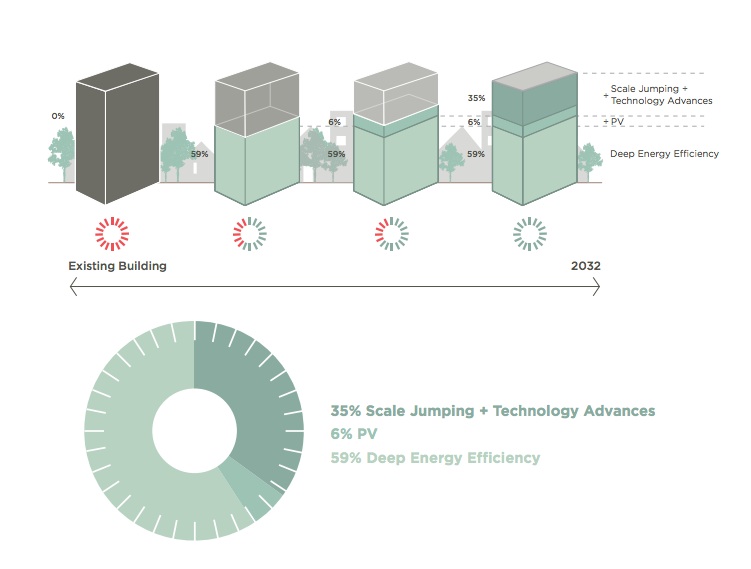The District of Columbia has more green buildings than other large U.S. cities on a per capita basis, according to the 2012 Green Building Report. D.C.’s policies have made it a leader in highly efficient building construction and renovation.
New goals will likely prompt the District to raise the efficiency bar even higher. To help guide policies for a new era of green design, D.C.’s Department of the Environment commissioned a study to assess costs and benefits associated with net zero energy, net zero water, and Living Buildings.
The Net Zero and Living Building Challenge Financial Study: A Cost Comparison Report for Buildings in the District of Columbia was conducted by International Living Future Institute, New Buildings Institute, and Skanska. The team’s analysis identified incremental cost premiums for deep energy and water conservation as well as for photovoltaic and water reuse systems that would bring a project to net zero.
The cost premium for energy efficiency was 1%-12% depending on building type, and rose to 5%-19% for net zero energy. “If the owner has sufficient tax appetite, tax credits and renewable energy credits make the return on investment approximately 30%, whereas the return on investment for energy efficiency alone was in the range of 5-12%,” the report says.
Read the full report at: http://newbuildings.org/net-zero-living-building-challenge-financial-study
Related Stories
| Mar 13, 2014
USGBC hits back at Environmental Policy Alliance criticism
The Washington, D.C.-based Environmental Policy Alliance has launched a campaign to make the claim that LEED-certified buildings are less energy efficient than other buildings. In response, USGBC told its members: "Don’t be fooled, the Environmental Policy Alliance isn’t the 'EPA' you might think."
| Mar 13, 2014
North Carolina board recommends switch to six-year code update cycle
In a nine to six vote, the North Carolina State Building Code Council on March 11 approved moving the commercial building code (except for the electrical code) to a six-year cycle for updating instead of a three-year cycle.
| Mar 13, 2014
OSHA’s funding disclosure requirement for those offering silica rule comments draws ire
The Occupational Safety and Health Administration is requiring those who submit comments on the silica rule to disclose their funding sources for their scientific research to avoid conflict of interest.
| Mar 13, 2014
EPA publishes ‘best management practices’ rule on erosion, stormwater at construction sites
The Environmental Protection Agency published a new rule this month that will require the construction, housing, and utility sectors to carry out "best management practices" in order to prevent erosion and harmful stormwater discharges at construction sites.
| Mar 5, 2014
San Francisco board seeks remedies to code enforcement complaints
Two supervisors charged that a lack of adequate code enforcement has led to blight from dilapidated or unfinished buildings.
| Mar 5, 2014
Obama proposes $1 billion for climate change risk mitigation
President Barack Obama would spend $1 billion to “better understand the projected impacts of climate change,” encourage local action to reduce future risk, and fund technology and infrastructure that will be more resilient to climate change.
| Mar 5, 2014
Southern Forest Products Assn. revamps pressure-treated pine specifications
It provides information to assist with the proper specification and use of pressure-treated Southern Pine materials.
| Mar 5, 2014
UL, PRI Construction Materials Technologies reach product certification agreement
Underwriters Laboratories (UL) Inc. reached an agreement with PRI Construction Materials Technologies LLC (PRI) through which PRI will participate in UL's "Data Acceptance Program," enabling the acceptance of data generated at PRI toward UL product certification.
| Mar 5, 2014
Quebec's building code doesn't meet needs of its aging population
The issue was raised in the wake of a tragic fire at a seniors' residence in L'Isle-Verte.
| Mar 4, 2014
Massachusetts Congressional delegation asks FEMA to slow flood zone map requirements
After a recent successful challenge of the scientific methodology used to redraw the coastal high-hazard zones, the Massachusetts congressional delegation is asking federal officials to put the brakes on new flood zone maps for the Bay State.














